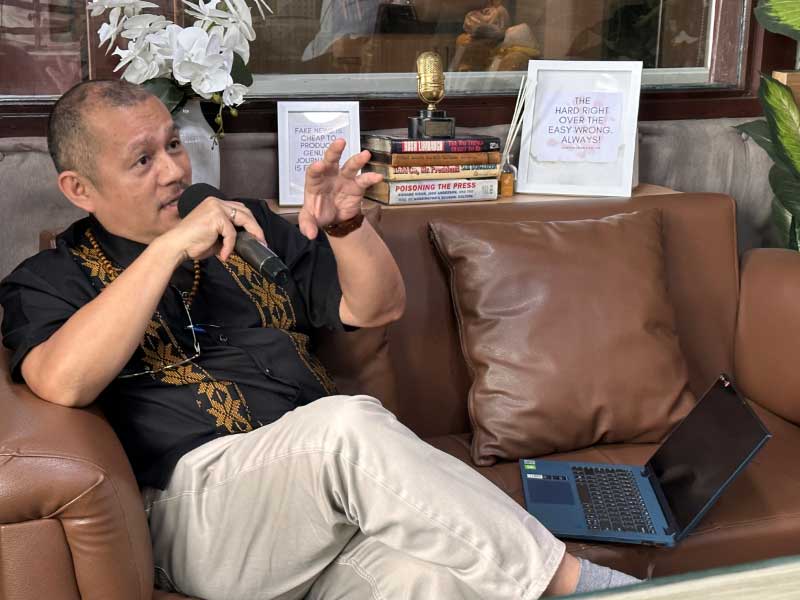
By Joseph Bernard A. Marzan
The University of the Philippines Visayas (UPV) on Friday hinted at a major digital shift in some of its courses.
UPV Chancellor Clement Camposano broached the plan with Daily Guardian on Air via Aksyon Radyo-Iloilo Friday as part of the UP System’s thrust toward digital transformation.
Under the proposal, classes for some General Education subjects like Political Science 11 or Rizal, for example, would be conducted online using curated resources for the students’ asynchronous learning.
Camposano described the program to be ‘gamified’ where students would ‘move up a level’ if they pass an exam or accomplish an activity.
The course software or packet can be downloaded to devices and students can work on their subjects even in offline mode.
Camposano said he already brought up the proposal with the UP system’s Special Adviser for Digital Transformation, Dr. Emmanuel Lallana.
“One of the things we envision is to convert, as a proof of concept, a few subjects into fully-digital [modes]. All the resources that you would need would be curated. The students simply have to go through a process, which is gamified. Once they are able to read the resources, they take an exam, and then go up one level, like a game,” Camposano explained.
“[W]e do recognize the value of face-to-face interaction. We also have online [sessions], and there are times when online is a convenient choice because of bad weather. But we would be experimenting with some subjects soon. We would not be holding classroom instructions, just interacting in the digital space, and the faculty member will only interact with students,” he added.
Camposano said the new learning mode would allow the students to learn on their own, with less guidance from their faculty instructors, and capitalize on their being ‘digital natives’.
“For decades, we’ve been talking about learner-centered education. […] Let’s revisit this idea, this directive concept of education, and learn to think of students as assuming more responsibility for the learning. Because whatever the professor does, if the student is lazy, they cannot do anything, but a hard-working student who is genuinely curious and excited about the course will learn on his own, class or no class,” the chancellor said.
“The concept that the teacher should be the one to shape the learning experience of the students, that is in fact, also an assumption. Why can’t teachers just be facilitators of learning, to just facilitate? [Teachers] can give inputs, for example, if talking about political theory, discussing the organic concept of the State according to the classical Greeks, from time to time [they] can give lectures. But those lectures can also be recorded. The rest of the learning process, if the student is driven, they can manage, for the most part on their own,” he added.
Camposano said that the university has the infrastructure to implement this system, but declined to comment directly on whether there is a budget allocated.
He added that they may start exploring the idea with the inauguration of the UPV Extension Campus in Pandan, Antique, next month.
The campus would be equipped with a Starlink connection, expected to have 174 Megabits per second (Mbps), donated by Ricardo Banaag, President and Chief Executive Officer of DFNN.
“The budget can always increase. We can always do with more resources. But I think we’re ready to start exploring this,” he remarked.
ARTIFICIAL INTELLIGENCE
Camposano also shared his take on the rise of artificial intelligence (AI), stating that alleged fears are normal, and that the public would soon learn to adapt and work with this technological leap.
“Historically, all technology has caused fears, every new technology, and we’re not only talking about nuclear technology, even the most basic technologies. These fears, I think, are driven partly by the fear of the unknown. We’re always afraid of what we don’t know,” Camposano said.
He cited two particular ‘sources’ of public fear against technology – entertainment media and the climate crisis.
“Media, or rather the entertainment industry [in particular], has been rather partial towards drumbeating the danger of technology. When we look at the films we watch like [the] ‘Terminator’ [franchise], apocalyptic, dystopian, ‘Mad Max’, like that,” he stated.
“Partly, [another] basis of this fear is because we are in the middle of a climate crisis. We are what social scientists call the Anthropocene, that period in history where change is mainly driven by human activity,” he added.
He opined that instead of feeding into the fear of technology, institutions must look internally.
“[I]t’s a fact of history that technological advancement will always be ahead of institutional design and our laws. That’s a given, but the question is, can we catch up? Are we adopting the right policies? Are we designing or redesigning our institutions in such a way that instead of being undermined by technology, we’re able to take advantage of the technology?” he said.
As to the UP System, he referred to the UP Principles for Responsible Artificial Intelligence, which he said was the university’s move in response to the use of AI in the education system.




















